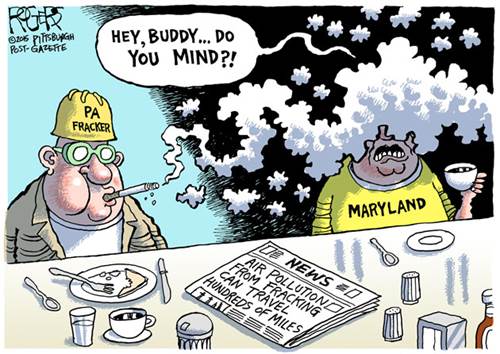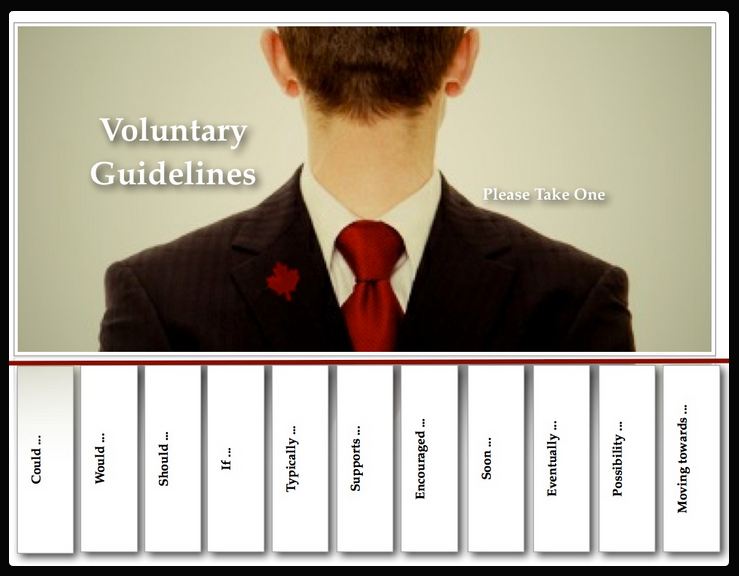
The Pittsburgh Post-Gazette endorsed Trump and got rid of award-winning cartoonist Rob Rogers (for being honest?). My favourite of Mr. Roger’s brilliant cartoons is included below.
A few of the comments to the article:
Not Saying:
Fracking is an environmental disaster, which is exactly why more enlightened places have completely banned it.
1st and ten:
No one ever thinks enough about the toxic waste created by these Marcellus Shale drilling and fracking operations. Toxic waste that is known to be radioactive. So where did all the toxic waste end up from the wells drilled next to Deer Lakes Park?
WASTE REPORT excerpts for just 1 of the 9 wells:
There are 207 entries on the WASTE REPORT for the GULICK 3H well, with a majority of the listings for well pads all over Washington County, as well as these 6 entries for ARDEN LANDFILL. Notice that 4 of the listings are for “Soil contaminated by Oil and Gas related spills:
December 2017: 0.95 tons Drilling Fluid Waste 1.95 tons of Synthetic Liner Materials
February 2018: 150.21 tons of Drill Cuttings 1.13 tons of Soil Contaminated by Oil and Gas Related Spills
June 2018: 1.65 tons of Soil Contaminated by Oil and Gas Related Spills
March 2018: 2.73 tons of Synthetic Liner Materials
October 2018: 4.91 tons of Soil Contaminated by Oil and Gas Related Spills
February 2019: 1.58 tons of Soil Contaminated by Oil and Gas Related Spills (NOTE: 1 ton = 2,000 lbs.)
Drilling down (pun intended) a bit further on the well site developed next to Deer Lakes Park we find these PA DEP violations:
Site Inspections for the GULICK WELL SITE 753289 Enforcement ID 324692 – Notice of Violation 6/24/2015 – PROHIBITION AGAINST OTHER POLLUTIONS – Discharged substance of any kind or character resulting in pollution of Waters of the Commonwealth.
Inspection ID 2485985 – “On 1/22/16, I performed an incident inspection at the Gulick site in response to a spill report received that morning.”
Inspection ID 2712975 – 3/29/2018 – Follow-up Inspection 5 Outstanding Violations:
1) Operator discharged brine or other fluids on or into the ground or into the waters of the Commonwealth,
2) Conducting an activity without a permit or contrary to a permit,
3) Person stored, transported, processed, or disposed of residual waste inconsistent with or unauthorized,
4) Person disposed, processed, stored, or permitted the disposal, processing or storage of residual waste contrary to rules and regulations,
5) Person dumped or deposited, or permitted the dumping or depositing, of solid waste onto the surface of the ground or underground or into the waters of the Commonwealth without a permit.
ROFL: “Hydraulic fracturing is a delicate process” — as delicate as a herd of elephants!
It pollutes massive quantities of water with toxins including radioactive waste. The industrial processes contribute to Allegheny County’s failing air quality grades with thousands of diesel truck trips and VOC emissions.
Your logic would also permit a steel mill next to park property, trouble is, pollution travels.

Health studies point to particularly fracked health within one mile of drill sites, and local gas well fires explosions evacuated that same radius. Educate yourselves!
The shale gas industry has a proven track record: If they’re drilling, they’re spilling — you totally ignore all their DEP violations and recent criminal charges by the AG’s office! Spills run into neighboring waterways and cause fish kills, then it happens again, just ask your poster boys down at Southpointe.
And then there’s the elephant in the room with climate change and shale gas production’s huge methane contributions.
Bottom line: You’re pretty unhinged with your pro-industry slant, editorial board, just ask Hopey and Templeton who reported on this polluting industry for you over past decades.
Banning drilling under county parks still misguided by The Editorial Board, Nov 13, 2021, Pittsburgh Post-Gazette
Allegheny County Council is once again considering a bill to ban natural gas drilling under county parks. And once again, we believe the move is misguided.
We agree with proponents of the ban on some essential principles. For instance, public lands should be set aside for public use, not exploited for private profit. And county parks should be stewarded to preserve their natural beauty and to enhance their usefulness for recreation, not to maximize resource extraction.
However, allowing private companies to retrieve shale gas from a mile underneath county parks does nothing to damage the public nature of the land itself. And horizontal drilling technology allows the resource to be extracted without a single industrial truck or piece of equipment or tablespoon of concrete blemishing the park’s landscape.
Further, we have a proof of concept for how it works: The Range Resources shale gas operation near and under Deer Lakes Park, approved by county council in 2014, is completely invisible to park visitors. Despite the sincere but rather doomsday predictions of anti-drilling advocates, Deer Lakes has not only survived, it has thrived.
According to Allegheny County, Range Resources has met all its obligations under that lease, resulting in a $5 million investment across the county’s nine parks. In Deer Lakes specifically, this has meant a new playground, new bathroom facilities, wastewater treatment upgrades, and other recreational enhancements.
The only disappointment, which the county should consider in any future leases, is that annual royalties have come in at under half of the projected $3 million per year, in part due to fluctuation in the market price of natural gas.
Now, advocates for the ban would also point to general environmental and public health concerns about fracking. Here, we agree with the majority of experts: Hydraulic fracturing is a delicate process, but is generally a safe process — when best practices are scrupulously followed and no corners are cut. Potential corporate partners should be rigorously vetted, and regulations strictly enforced. ![]() Best practices are voluntary, loaded with escape hatches.
Best practices are voluntary, loaded with escape hatches.![]()

If, on the other hand, county council members believe that fracking is intrinsically dangerous, no matter what precautions are taken, they should seek to ban it countywide; it doesn’t make sense only to focus on county parks. If there’s no buy-in for that measure, then there shouldn’t be for this one — unless, as we suspect, it is largely a symbolic move, since there are no live proposals to drill under county parks.
We reiterate the point we made back in 2015, the last time this issue came to a vote on the council: Blanket bans on legitimate industrial operations make no more sense than blanket approvals. Every proposal should be considered on a case-by-case basis. A bid from one company to drill under one park might be worthy, while a bid from a different company to drill under another park might be dodgy.
It doesn’t necessarily violate our duty to steward public lands to allow shale gas to be extracted from beneath them. County council should return to more pressing business, then consider specific proposals when — or if — they come in.
